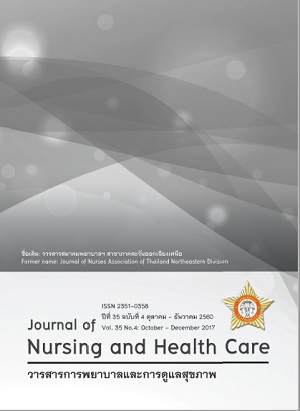ผลของโปรแกรมการป้องกันอันตรายจากการใช้ยาฆ่าแมลงของชาวนาไทย ในอำเภอสองพี่น้อง จังหวัดสุพรรณบุรี Effects of Insecticide Using Prevention Program on Thai Farmers in Songphinong District, Suphanburi
คำสำคัญ:
ชาวนา โปรแกรมการป้องกันอันตรายจากการใช้ยาฆ่าแมลง พฤติกรรมป้องกันตนเองจากการใช้ยาฆ่าแมลง, farmers insecticide using prevention program Self-Protective Behaviors in Using Insecticidesบทคัดย่อ
การใช้ยาฆ่าแมลงของชาวนา ประกอบกับการมีพฤติกรรมป้องกันตนเองที่ไม่เหมาะสม ทำให้เป็นภัยคุกคามต่อภาวะสุขภาพจากการได้รับสัมผัสและส่งผลทำให้เกิดอาการพิษแบบเฉียบพลัน และพิษสะสมเรื้อรังได้ โปรแกรมการป้องกันอันตรายจากการใช้ยาฆ่าแมลงนี้ เป็นโปรแกรมที่สร้างจาก Health Belief Model โดยเป็นการวิจัยกึ่งทดลอง ศึกษาในกลุ่มชาวนา ในอำเภอสองพี่น้อง จังหวัดสุพรรณบุรี ทั้งหมด 84 คน เลือกกลุ่มตัวอย่างแบบแบบเจาะจง ใช้เทคนิคการจับคู่ คำนึงถึง เพศและประวัติการได้รับการอบรมการใช้สารเคมี แบ่งกลุ่มตัวอย่างเป็น 2 กลุ่มๆละ 42 คน ซึ่งมีลักษณะทางประชากรไม่แตกต่างกัน โดยกลุ่มทดลอง ได้รับโปรแกรมการป้องกันอันตรายจากการใช้ยาฆ่าแมลง ซึ่งเป็นกิจกรรมสร้างพลังการรับรู้ในการป้องกันอันตรายจากการใช้ยาฆ่าแมลง ทั้งหมด 3 ครั้ง ในสัปดาห์ที่ 1 สัปดาห์ที่ 2 และสัปดาห์ที่ 6 และกลุ่มควบคุม ไม่ได้รับโปรแกรมใดๆ มีระยะเวลาศึกษาทั้งหมด 10 สัปดาห์ และหลังจากเสร็จสิ้นการทดลองในสัปดาห์ที่ 10 ได้รับการประเมินพฤติกรรมป้องกันตนเองจากการใช้ยาฆ่าแมลง โดยวิเคราะห์เปรียบเทียบ คะแนนเฉลี่ยด้านพฤติกรรมป้องกันตนเองจากการใช้ยาฆ่าแมลงของกลุ่มทดลองและกลุ่มควบคุมด้วยสถิติแมนวิชนี่ ยู
ผลการศึกษา พบว่า หลังเข้าร่วมโปรแกรม ชาวนากลุ่มทดลองมีคะแนนเฉลี่ยด้านพฤติกรรมป้องกันตนเองจากการใช้ยาฆ่าแมลง สูงกว่าชาวนากลุ่มควบคุมอย่างมีนัยสำคัญทางสถิติ (U = 0.000, p < 0.001) แสดงให้เห็นว่า โปรแกรมการป้องกันอันตรายจากการใช้ยาฆ่าแมลง มีผลทำให้พฤติกรรมป้องกันตนเองจากการใช้ยาฆ่าแมลงของชาวนาดีขึ้น ดังนั้น ผู้วิจัยจึงมีข้อเสนอแนะในการทำวิจัยครั้งต่อไป ดังต่อไปนี้ 1) สร้างเครื่องมือวัดตัวแปรต้นด้านการรับรู้ตาม Health Belief Model 2) ควรศึกษาในชาวนาที่นอกเหนือจากพื้นที่ของคลินิกสุขภาพเกษตรกร ซึ่งไม่เคยได้รับการอบรมเกี่ยวกับการใช้สารเคมีมาก่อน โดยศึกษาในช่วงเดือนมิถุนายนถึง สิงหาคม (นาปี) หรือ กุมภาพันธ์ – มีนาคม (นาปรัง) เพื่อสามารถสังเกตและประเมินพฤติกรรมป้องกันตนเองได้ชัดเจนมากยิ่งขึ้นและ 3) ควรเพิ่มข้อมูลของค่าดัชนีทางชีวภาพ เพื่อพิสูจน์ประสิทธิภาพของโปรแกรมในการลดผลกระทบต่อการรับสัมผัสฆ่าแมลง เช่น การตรวจระดับเอนไซม์โคลีนเอสเตอเรสจากปลายนิ้ว หรือ การตรวจหาสารเมตาบอไลต์ของสารฆ่าแมลงในปัสสาวะ ภายหลังรับสัมผัสใน 24 ชั่วโมง เป็นต้น และผู้วิจัยได้มีข้อเสนอแนะในการนำผลการวิจัยไปใช้ ดังนี้ 1) ควรสนับสนุนให้พยาบาลและบุคลากรสาธารณสุข ได้นำโปรแกรมไปประยุกต์ใช้ในการพัฒนาศักยภาพในการปรับเปลี่ยนพฤติกรรมป้องกันตนเองจากการใช้ยาฆ่าแมลง โดยเน้นการสร้างพลังการรับรู้ และส่งเสริมสมรรถนะพยาบาลเวชปฏิบัติชุมชนในการสร้างพลังอำนาจ เพื่อให้เกิดการรับรู้ที่ดีทั้ง 6 องค์ประกอบตาม Health Belief Model และ 2) การปฏิบัติการพยาบาลของพยาบาลเวชปฏิบัติ ในคลินิกสุขภาพเกษตรกร ควรมีการเยี่ยมบ้าน ซึ่งเป็นกิจกรรมสำคัญที่จะทำให้ชาวนาปฏิบัติพฤติกรรมป้องกันตนเองอย่างเป็นประจำต่อเนื่อง เพื่อให้เกิดการคงอยู่ของพฤติกรรมที่ดี
The use of insecticides and improper self-protective behaviours of threaten their farmers health due to contact with insecticides, that results in acute and accumulated chronic toxicity. This program for protecting Thai farmers’ hazards against the use of insecticides was created based on the Health Belief Model. This was a quasi-experimental study conducted among 84 farmers who were purposively sampled using the matched pair technique with consideration given to gender and history of training on the use of chemicals. The subjects were divided into two groups with 42 subjects in each group. The experimental group received the program for preventing hazards from insecticide use with three empowerment activities on perceived prevention of dangers from insecticide use at Weeks 1, 2 and 6. The control group received no such program. This study was conducted over a period of ten weeks. After completing the experiment at Week 10, the subjects were assessed for self-protection behaviors in using insecticides by analyzing and comparing the mean scores of self-protective behaviors in using insecticides among the experimental group and the control group by using Mann-Whitney U statistics. According to the findings, the farmers in the experimental group were found to have a higher mean score for self-protection behaviour using insecticides than the farmers in the control group after the experiment with statistical significance (U = 0.000, p < 0.001). This demonstrates that the program for preventing danger from insecticide use improved farmers self-protective behaviors in using insecticides. Therefore, the researcher offers the recommendations for Future Studies: 1) Instruments should be created to measure independent variables in the area of perception based on the Health Belief Model 2) Other groups of farmers outside the area of Farmers Health Clinics who did not receive training on chemical use should be studied to help farmers learn self-protective behaviors and studies should be conducted during the period when farmers use insecticides with the greatest prevalence in June – August to be able to observe and assess self-protective behaviors more clearly 3) Data on biomarkers should be increased to prove program efficiency in reducing effects from exposure to pesticides such as tests of cholinesterase enzyme levels from fingertips at Week 6 after launching the program because the aforementioned period is suitable time related to increases in cholinesterase enzymes if farmers have good protection behaviors or test for insecticide metabolites in urine within 24 hours after exposure, etc. The researcher offers following recommendations: 1) Nurse practitioners or care provider should be encouraged to implement the program to build capacity for adjusting self-protective behaviors in using insecticides by focusing on building perception empowers under the Health Belief Model; 2) Nurse practitioners should include home visits as an important activity for helping farmers perform regular and consistent self-protective behaviors to maintain self-protective behaviors in using insecticides



